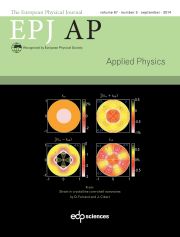Crossref Citations
This article has been cited by the following publications. This list is generated based on data provided by
Crossref.
Zhiyu Chen
2002.
Impedance matching for one atmosphere uniform glow discharge plasma (OAUGDP) reactors.
IEEE Transactions on Plasma Science,
Vol. 30,
Issue. 5,
p.
1922.
Singh, Kunwar Pal
and
Roy, Subrata
2007.
Impedance matching for an asymmetric dielectric barrier discharge plasma actuator.
Applied Physics Letters,
Vol. 91,
Issue. 8,
Hemke, Torben
Wollny, Alexander
Gebhardt, Markus
Brinkmann, Ralf Peter
and
Mussenbrock, Thomas
2011.
Spatially resolved simulation of a radio-frequency driven micro-atmospheric pressure plasma jet and its effluent.
Journal of Physics D: Applied Physics,
Vol. 44,
Issue. 28,
p.
285206.
Chau, Kenny
Millare, Brent
Lin, Adam
Upadhyayula, Srigokul
Nuñez, Vicente
Xu, Hong
and
Vullev, Valentine I.
2011.
Dependence of the quality of adhesion between poly(dimethylsiloxane) and glass surfaces on the composition of the oxidizing plasma.
Microfluidics and Nanofluidics,
Vol. 10,
Issue. 4,
p.
907.
2012.
Nonthermal Plasma Chemistry and Physics.
p.
269.
Li, Shou-Zhe
Li, Hong
Zhang, Jialiang
Wang, Shangmin
Wang, Yong-Xing
and
Jin, Zhu-Ji
2014.
Effect of Transmission Line on Impedance Matching of Atmospheric-Pressure Radio-Frequency Capacitive Microplasma Discharge.
IEEE Transactions on Plasma Science,
Vol. 42,
Issue. 6,
p.
1654.
Joshi, J. K.
Binwal, S.
Karkari, S. K.
and
Kumar, Sunil
2018.
Electron series resonance in a magnetized 13.56 MHz symmetric capacitive coupled discharge.
Journal of Applied Physics,
Vol. 123,
Issue. 11,
Khomenko, Andrei
and
Macheret, Sergey
2019.
Capacitively coupled radio-frequency discharge in alpha-mode as a variable capacitor.
Journal of Physics D: Applied Physics,
Vol. 52,
Issue. 44,
p.
445201.
Khomenko, Andrei
Podolsky, Vlad
and
Wang, XingXing
2021.
Different approaches of measuring high-voltage nanosecond pulses and power delivery in plasma systems.
Electrical Engineering,
Vol. 103,
Issue. 1,
p.
57.
Gao, Jiamao
Yu, Shimin
Wu, Hao
Wang, Yu
Wang, Zhijiang
Pan, Yuan
Jiang, Wei
and
Zhang, Ya
2022.
Self-consistent simulation of the impedance matching network for single frequency capacitively coupled plasma.
Journal of Physics D: Applied Physics,
Vol. 55,
Issue. 16,
p.
165201.
Wu, Hao
Chen, Zhaoyu
Yu, Shimin
Wang, Qixuan
Li, Xiandi
Jiang, Wei
and
Zhang, Ya
2022.
The effects of match circuit on the breakdown process of capacitively coupled plasma driven by radio frequency.
Journal of Applied Physics,
Vol. 131,
Issue. 15,
Yu, Shimin
Chen, Zili
Wu, Hao
Guo, Lianbo
Wang, Zhijiang
Jiang, Wei
and
Zhang, Ya
2022.
Best impedance matching seeking of single-frequency capacitively coupled plasmas by numerical simulations.
Journal of Applied Physics,
Vol. 132,
Issue. 8,
Chen, Zhaoyu
Xu, Jingwen
Wang, Hongyu
Wu, Hao
Jiang, Wei
and
Zhang, Ya
2023.
Influence of external circuitry on CF4 breakdown process in capacitively coupled plasma.
Journal of Vacuum Science & Technology B,
Vol. 41,
Issue. 5,
Xiao, Yuhua
Brandon, Joel
Morsell, Joshua
Nam, Sang Ki
Bae, KiHo
Lee, Jang-Yeob
and
Shannon, Steven
2023.
Effect of focus ring with external circuit on cathode edge sheath dynamics in a capacitively coupled plasma.
Journal of Vacuum Science & Technology A,
Vol. 41,
Issue. 3,
Watson, Sean
Pattyn, Cedric
Mohseni Garakani, Mansoureh
Ajji, Abdellah
Reuter, Stephan
and
Wertheimer, Michael R.
2023.
Wetting and aging behaviors for several O2 and NH3 plasma treated nanofibrous and flat film polymer materials: A comparison.
Plasma Processes and Polymers,
Vol. 20,
Issue. 6,
Sovizi, Saeed
Angizi, Shayan
Ahmad Alem, Sayed Ali
Goodarzi, Reyhaneh
Taji Boyuk, Mohammad Reza Rahmani
Ghanbari, Hajar
Szoszkiewicz, Robert
Simchi, Abdolreza
and
Kruse, Peter
2023.
Plasma Processing and Treatment of 2D Transition Metal Dichalcogenides: Tuning Properties and Defect Engineering.
Chemical Reviews,
Vol. 123,
Issue. 24,
p.
13869.
Yuan, Qianghua
Shan, Liwen
Yin, Guiqin
Huang, Yutian
and
Liu, Zhaohui
2024.
Influence of Matching Network on the Discharge Characteristic of Dual—Frequency Capacitively Coupled Ar Plasma.
Contributions to Plasma Physics,
Yu, Shimin
Chen, Zili
Xu, Jingwen
Wang, Hongyu
Wang, Lu
Wang, Zhijiang
Jiang, Wei
Schulze, Julian
and
Zhang, Ya
2024.
Impedance matching design for capacitively coupled plasmas considering coaxial cables.
Journal of Physics D: Applied Physics,
Vol. 57,
Issue. 47,
p.
475204.
Cao, Dehen
Yu, Shimin
Chen, Zili
Wang, Yu
Wang, Hongyu
Chen, Zhipeng
Jiang, Wei
and
Zhang, Ya
2024.
Optimizing impedance matching parameters for single-frequency capacitively coupled plasma via machine learning.
Journal of Vacuum Science & Technology A,
Vol. 42,
Issue. 1,


